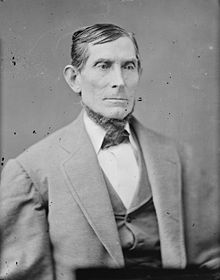James D. Williams
James Douglas Williams (born January 16, 1808 in Pickaway County , Ohio , † November 20, 1880 in Indianapolis , Indiana ) was an American politician ( Democratic Party ) and from 1877 to 1880 the 17th governor of the state of Indiana, whom he also represented in Congress .
Early years
James Williams came to Knox County , Indiana , with his parents at a young age . There he attended elementary school. He then worked in agriculture. He was to remain associated with this branch of the economy his entire life.
Political career
Williams' political rise began in 1839 as a Justice of the Peace in Vincennes . He held this office for four years. Between 1843 and 1872 he sat several times in both the House of Representatives and the Indiana Senate . Between 1855 and 1871 he was also a member of his state's Agriculture Council. In 1872 he applied unsuccessfully for a seat in the US Senate . In the same year he was a delegate to the Democratic National Convention in Baltimore . On March 4, 1875, he was elected to the United States House of Representatives .
He resigned this mandate on December 1, 1876 after he had been elected governor of Indiana against the later Republican President Benjamin Harrison . Williams took up his new office on January 8, 1877. During his tenure, work began on what is now the Indiana Statehouse . As governor, he had to end a railroad strike. There was also labor unrest in the country at the time, which the governor and his government had to grapple with. James Williams did not live to see the end of his term of office: He died in office in November 1880. He was married to Nancy Huffman, with whom he had four children.
Web links
- James D. Williams in the Biographical Directory of the United States Congress (English)
- James Williams in the National Governors Association (English)
- Indiana Historical Bureau (English)
- James D. Williams in the database of Find a Grave (English)
| personal data | |
|---|---|
| SURNAME | Williams, James D. |
| ALTERNATIVE NAMES | Williams, James Douglas (full name) |
| BRIEF DESCRIPTION | American politician |
| DATE OF BIRTH | January 16, 1808 |
| PLACE OF BIRTH | Pickaway County , Ohio |
| DATE OF DEATH | November 20, 1880 |
| Place of death | Indianapolis , Indiana |


